Dust Storms Sweep Iran
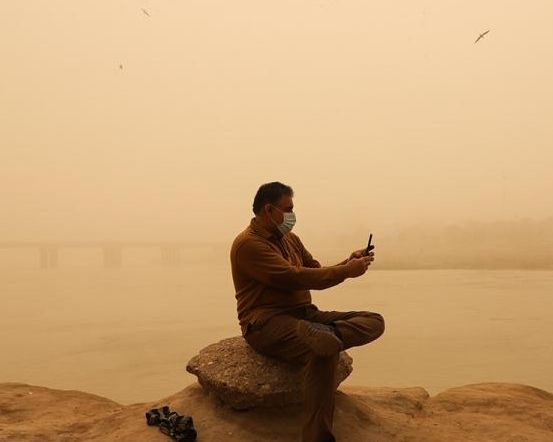
Dust has engulfed over a dozen Iranian provinces and the storm is expected to continue until early April, head of the national taskforce for mitigation of sand and dust storms said Monday.

Dust has engulfed over a dozen Iranian provinces and the storm is expected to continue until early April, head of the national taskforce for mitigation of sand and dust storms said Monday.
The dust was coming from within Iran and from outside, Ali Mohammad Tahmasbi Birgani said. This was an international challenge, he said, needed action including through the United Nations Development and Environment Programs and the Asian and Pacific Centre for the Development of Disaster Information Management: “We have a large number of bilateral and multilateral agreements with neighboring countries, including Iraq, Syria and Turkey, but no operational action has been taken.”
A report from the Carnegie Endowment for International Peace in February projected temperatures in the Middle East and North African will rise “by at least 4°C by 2050 − that is, if greenhouse gases continue to increase at the current rate − and heat waves are set to be experienced ten times more frequently by the same year.”
Carnegie predicted growing migration, food insecurity and conflicts over resources: “In addition to increased water scarcity, climate change will produce increased aridity in parts of the MENA region in the next century, thus shrinking arable lands and disrupting agricultural patterns. Moreover, already dry soil is set to become drier, and desert dust will increasingly accumulate in the atmosphere and create more sandstorms, especially in Iraq, Saudi Arabia, and Syria.”
Dust storms and other pollutants have increased markedly in recent years in several Iranian provinces, including Khuzestan, Kermanshah, and Sistan-Baluchestan.
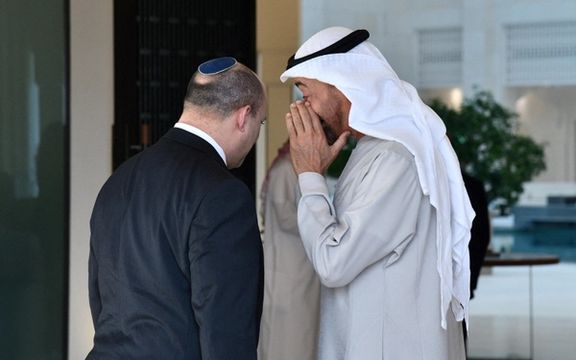
The United Arab Emirates and Israel are coordinating appeals to the US to formulate a new security strategy for the Middle East in case of a nuclear deal with Iran.
In a report Monday, Bloomberg cited “five people familiar with the matter” that the UAE and Israel believe they can use the Ukraine crisis and rising oil prices to extract concessions from Washington over intelligence and defense they were previously denied.
The UAE has bought billions of advanced weapons from the US, with one deal alone under the Trump administration put at $23.5 billion. US annual military aid to Israel is over $3.5 billion.
The two countries, which established diplomatic relations in 2020, have both received criticism in the US for equivocating over the Russia intervention in Ukraine, with Israeli premier Naftali Bennett heading to Moscow to mediate and the UAE abstaining on UN votes.
Bloomberg reported the two are coordinating in the belief that the situation is favorable to a shared approach towards the US, arguing that Iran’s foreign exchange income, and therefore its defense capacity, would be boosted if US sanctions are eased with a revived nuclear agreement.
According to the report, a senior Biden administration official said there were discussions about Iran, but did not confirm any commitment to a new plan. Iran’s Sunday missile attack at Erbil, northern Iraq, in response to an Israeli air strike a week earlier that killed two Iranian officers in Damacus, highlighted continued region tensions.
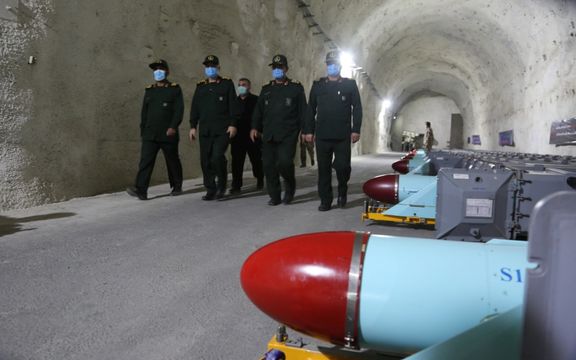
Iran's foreign ministry warned Iraqi authorities on Monday that Tehran would not tolerate the use of Iraqi soil by third parties to conduct attacks against Iran.
“The central government of Iraq has the responsibility to ensure that its territory is not used as a base for attacks by third parties against Iran,” the ministry’s spokesman Saeed Khatibzadeh told reporters at his weekly press conference in Tehran Monday. "We urge the Iraqi government to end insecurity in its borders once and for all."
“Iraqi territory was used several times in the past against Iran by third parties including terrorist groups such as Kurdish militants, the United States and the Zionist entity,” he said adding that Tehran had repeatedly warned Iraqi authorities about the use of territory by third parties to attack Iran.
The comment came a day after Iran's Revolutionary Guards (IRGC) targeted the capital of Iraq's autonomous Kurdistan, Erbil, with over a dozen ballistic missiles. In a statement hours after the attack Sunday, the IRGC took responsibility for targeting Erbil to destroy a "strategic center for conspiracy and evil of the Zionists" for Israel's "recent crimes" against Iran.
The IRGC statement did not specify Israel's "recent crimes" against Iran but on Sunday media including Iran's English language Press TV, claimed the attack was in retaliation for an Israeli airstrike on the Syrian capital of Damascus last Monday in which two IRGC officers were killed. Press TV also called Iran's retaliation a "wake up call for Iraqis about Israeli danger".
But it remains unclear why that last incident suddenly provoked Tehran while Israeli regularly bombs Iranian bases in Syria.
Another possible explanation is an alleged Israeli drone attack on a base inside Iran. Lebanon's pro-Hezbollah Al Mayadeen TV said on Monday that an Israeli base in Erbil led an attack by six drones on a Revolutionary Guard base in Kermanshah, capital of the western province of Kermanshah, in January.
Pro-Iran Kata'ib Hezbollah of Iraq in a statement Monday quoted by the IRGC-linked Tasnim news agency also claiming the operation was launched "in reaction to Israeli drone bombing of locations inside Iranian territory from inside Iraq" and said this was the start of a "new kind of conflict" in Iraq.
These could refer to loud explosions heard in western Iran, including Kermanshah, on January 15 for which Iranian authorities did not offer a clear explanation. Social media reports at the time said there was anti-aircraft activity and one explosion near or at a military base.
Several other mysterious incidents at Iran’s nuclear and military sites since July 2020 have also been attributed to Israel, including the assassination of a top Iranian nuclear official.
Iraqi officials, including Prime Minister Mustafa al-Kadhimi and influential Shiite Cleric Muqtada al-Sadr whose party won a majority in the parliament last year, have strongly condemned the Iranian attack on Erbil.
In a tweet Sunday, Al-Kadhimi said this was "an attack on the security" of Iraqi people. Iraq's foreign ministry has summoned the Iranian ambassador to protest to the attack.
Press TV quoted the secretary general of pro-Iran Harakat Hezbollah al-Nujaba as saying that the Kurdistan region authorities “provide Mossad agents with refuge” which makes it allowable for any party to target the “Zionist spies.”
US officials on Sunday appeared to suggest that Iran’s missile attack on Erbil would not impact the chances of concluding a nuclear agreement with Tehran but some US lawmakers and former officials have urged President Joe Biden to end the talks in Vienna to revive the 2015 nuclear deal between Iran and world powers, Joint Comprehensive Plan of Action (JCPOA).
IRGC’s Sunday attack came during a pause in the Vienna nuclear after a last-minute Russian demand for US guarantees it can trade freely with Iran despite Western sanctions imposed for its invasion of Ukraine. Khatibzadeh insisted on Monday that Moscow's demands had nothing to do with the delay in signing an agreement as it was the United States that had to make a decision to accept Iran's demands.

France and Germany have condemned Sunday’s Iranian ballistic missile attack on Erbil, northern Iraq, for undermining efforts to revive the Iran nuclear deal.
Paris reiterated the "absolute urgency" of concluding Vienna negotiations and said that Tehran should halt "irresponsible and dangerous behavior" that “threatened stability in Iraq and the wider region.” A statement from a German foreign office spokesperson extended condolences to residents of Erbil.
“As a close partner of Iraq and of the Kurdistan Region of Iraq, we continue to support joint efforts to strengthen Iraq’s sovereignty, its unity and stability and in the fight against Daesh (ISIS)”, Berlin’s statement read.
Germany has up to 500 troops in Iraq, concentrated in the Kurdish region, with the German parliament recently extending their mission until at least October. Iraqi Prime Minister Mustafa al-Kadhimi announced at the end of 2021 the withdrawal of foreign troops from Iraq had begun.
Iran said Sunday the missiles targeted an Israeli facility in Erbil in response to an Israeli airstrike in Damascus that killed two Iranian soldiers March 7. Sunday’s missiles fell close to a United States consulate building, damaging a villa that presumably was used by Israelis and a Kurdish TV station. One civilian was injured.
Israel’s presence in northern Iraq goes back many decades, while some Iraqi political groups are divided over normalization of relations with Israel.
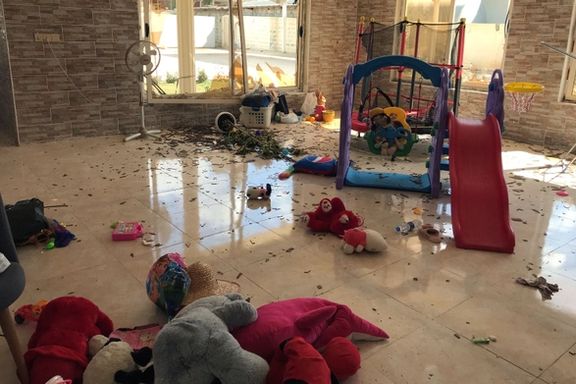
Both the Biden Administration and its critics have condemned Iran’s ballistic missile attack on Erbil in Iraq, but they differ on how to react toward Tehran.
The White House issued a statement by National Security Advisor Jake Sullivan on Monday, saying, “The United States stands with Prime Minister [Mustafa] Kadhimi and the leaders of the Kurdistan Region, President Nechirvan Barzani, and Prime Minister Masrour Barzani, in condemning this assault on the sovereignty of Iraq and its Kurdistan region”.
It expressed US support for “the full sovereignty, independence, and territorial integrity of Iraq”, noting, “We will support the Government of Iraq in holding Iran accountable, and we will support our partners throughout the Middle East in confronting similar threats from Iran”.
Iran claimed it targeted an Israeli spy station in Erbil but missiles fell close to a US consulate building, damaged a villa that presumably was used by Israelis and a Kurdish TV station.
The Wall Street Journal in an editorial said, "The Biden Administration’s hell-bent pursuit of a nuclear deal with Iran grows harder to understand with each provocation from Tehran. The latest came Sunday in a missile attack near a US Consulate under construction in northern Iraq."
Several lawmakers and former American officials have reacted to the attack apparently targeting the US consulate in Iraq’s Erbil urging an end to Iran nuclear talks, but some senior US officials have appeared to suggest that the assault would not impact the chances of concluding a nuclear agreement with Tehran.
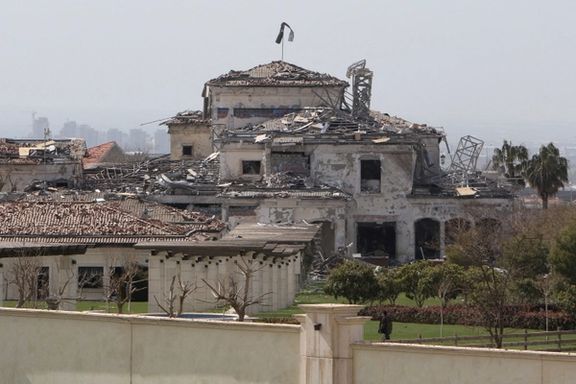
Referring to the intelligence agencies’ 2022 annual report, Representative Nicole Malliotakis said in a tweet on Sunday that such reports as well as the attack in Erbil “should put an end to all discussions on a new nuclear deal with Tehran”.
The 2022 Annual Threat Assessment published by the Office of Director of National Intelligence on Tuesday said, "We assess that Iran will threaten US persons directly and via proxy attacks, particularly in the Middle East,” adding, “Iran also remains committed to developing networks inside the United States—an objective it has pursued for more than a decade.”
On March 6, Secretary of State Antony Blinken sidestepped a question about whether the renewed nuclear agreement with Iran would also address threats on US soil, including threats against his predecessor, Mike Pompeo, and Trump administration Iran envoy Brian Hook to avenge the targeted killing of Iran's most powerful military general Qasem Soleimani in January 2020.
"We were very clear when we were in the deal originally that nothing about the deal prevents us from taking action against Iran when it's engaged in actions that threaten us, threaten our allies and partners. That will very much continue," Blinken said.
Concurring with Blinken that the threats do not have to be addressed in any renewed nuclear-related deal, House Intelligence Committee Chair Adam Schiff said, "These other malign activities of Iran's, their plots against the US personnel or Americans around the world we can deal with and have to deal with separately, and we should deal with them aggressively. We need to go after all of this, not necessarily in one agreement."
After the attack on Erbil, Pompeo reiterated that “Iran is the world’s largest state sponsor of terror. It must remain designated as such” adding that “Terrorist-related sanctions must remain in place”.
There have been reports that the Biden Administration has agreed to remove terror-related sanctions imposed by the previous administration to secure a nuclear agreement with Tehran.
Iran’s missile attack came as diplomats have stopped nuclear talks in Vienna after 11 months of negotiations even though they say an agreement was very close to be finalized. The pause came after Russia on March 5 demanded an exemption from Ukraine sanctions in its economic and other relations with Iran. Tehran has not objected to Russia’s sudden move, which is bound to delay an agreement and lifting of Iran’s economic sanctions, vital for the government.
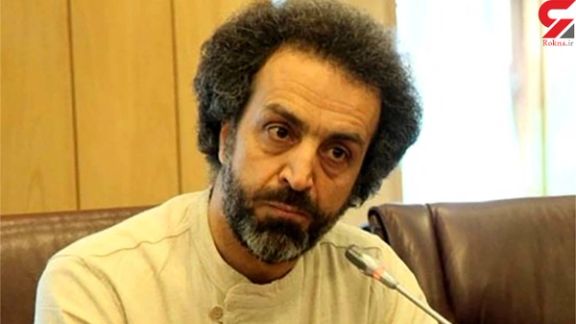
A professor in Iran says women should take charge of political and social change in the country, because they can succeed with fortitude, without violence.
The commentary by Esfahan University academic Mohsen Ranani, published by reformist newspaper Etemad in Tehran on Saturday, has met with angry reactions from Iran's conservative press.
Ranani's social commentary was also carried by many Iranian websites and quoted by dozens of Iranians on social media as a serious critique of the social and political situation in Iran. The commentary was taken from a speech by Ranani in Esfahan last week.
The academic said that the Iranian government pretends not to hear what critics and intellectuals say about the country's problems while officials openly call them "social germs" in their speeches. As a result, it appears that intellectuals have nothing more to say.
This, he said, has left only those who want regime change and pseudo-artists who crack jokes about everything, as the only groups who can win the hearts and minds of young Iranians.
The academic said young Iranians can either choose to be like Rouhollah Zam, the rebel journalist who was abducted abroad and hanged in Iran in 2020, or they can be careless and ignorant like Amir Tatallou, the controversial singer and a rebel in his own right who cooperated with Ebrahim Raisi's election campaign in 2017 but was later jailed and finally fled to Turkey where thousands of young Iranians go to attend his concerts.
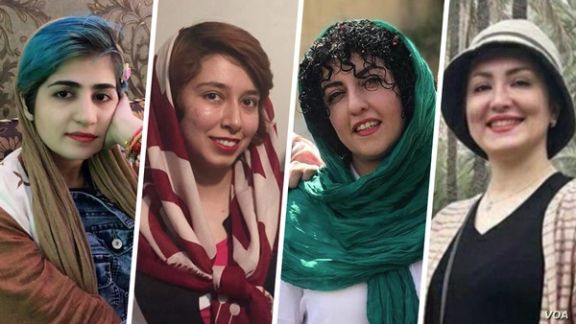
Under these circumstances, the only hope for a rational and ethical change in Iran can be pinned on Iranian women, Ranani said, adding that they are going forward step by step and taking back the self-confidence and rights men took from them in the course of history.
He suggested that Iran's male activists should give their place to women who act, instead of writing articles or delivering speeches. Ranani opined that women do not stage revolutions or riots as Iranian men did in the 20th century upheavals. He named several prominent female activists currently in Iranian prisons.
Ranani said that Iranian women will impose change on Iranian men, and traditional patriarchal government. "Their weapon is silence and calm resistance. They are armed with non-violent steadfastness," Ranani said, adding that "No power can resist against this silent resistance."
The IRGC-linked Javan newspaper said in a commentary that the academic was simply angry because the government has ignored him and accused Etemad of being a "radical media outlet" that has gone beyond the frontiers of press freedom in the Islamic Republic. Ironically the commentary in Javan was authored by a woman, Kobra Asupar.
Asupar also said that Ranani's comment about Iranian youths having no role models apart from Zam and Tatallou was an invalid and irrelevant generalization. About his comments regarding women, Asupar said that Iranian women played a major part in the Islamic revolution in 1979. So, Ranani cannot say that "good women have supported a bad revolution!"
Meanwhile, hardline daily Kayhan also lashed out at the academic, attacking his background as a reformist, claiming that reformists have plundered public resources and now pretend to be innocent. The Kayhan then blamed the reformists for all of Iran's problems and mentioned former President Hassan Rouhani and former Vice President Es'haq Jahangiri's brothers' involvement in corruption cases to prove its case and said that Ranani should be accountable for his support of reformist government's "harmful" economic policies.
The Kayhan called Ranani's commentary "an outrageous shift from plundering the people's resources to claiming to be following their demands."